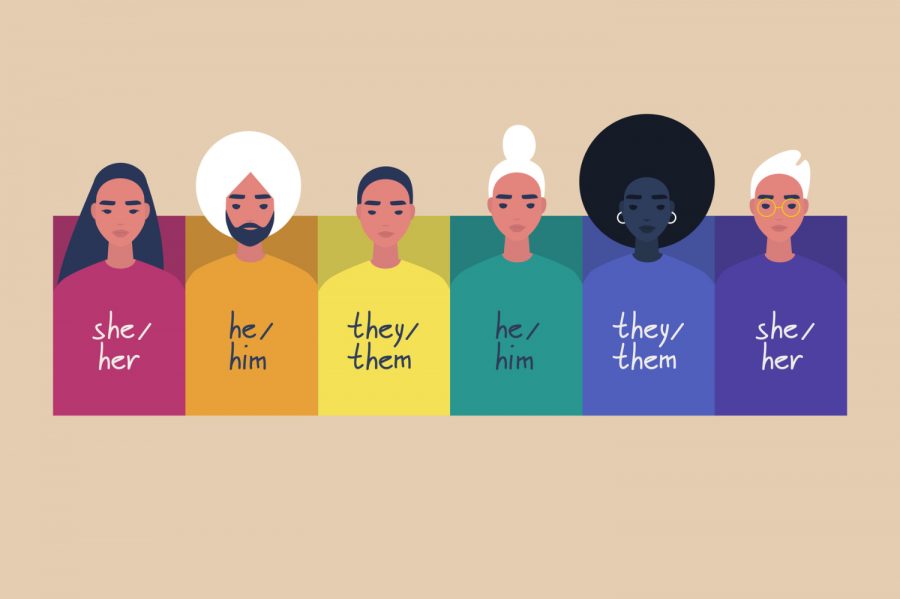Opinion | Pronouns matter
To create a more accepting culture, we need open discourse about pronouns.
January 24, 2022
My name is Sophia, and I use she/her/hers pronouns.
To some, introducing yourself and pronouns may seem redundant. However, we have come to recognize more forms of gender identity and expression in recent years. Identifying our pronouns is one step we can make to create a more inclusive culture.
While some people may not see the significance of pronouns, recognizing and respecting them can impact a person’s identity and feelings of acceptance. This can be especially true for people who are transgender or nonbinary.
The topic of pronouns — more specifically gender-neutral pronouns — has become a larger conversation in recent years. In just three years, the number of 18-29 year-olds who know someone that uses gender-neutral pronouns increased by 14 percent. As of 2021, nearly 46 percent of adults 18-29 know someone who uses gender-neutral pronouns.
In older generations, pronouns have less cultural significance. Pronouns outside of she/her/hers and he/him/his were less common. In understanding the significance a pronoun has, it can be helpful to first grasp an understanding of how identity can differ from individuals.
The term cisgender refers to a person whose identity and gender corresponds with their assigned sex at birth. The common pronouns associated with cisgender individuals include she/her/hers and he/him/his.
Contrary to the term cisgender, transgender refers to a person whose identity and gender does not correspond with their sex at birth. Pronouns associated with transgender people can include she/her/hers and he/him/his. Others may use more pronouns like they/them/theirs.
The term nonbinary refers to a person whose identity lies outside of the gender binary, meaning they do not identify as male or female. The common pronouns associated with nonbinary individuals are they/them/theirs, which is used as a singular term.
Just because pronouns play a larger significance in today’s culture does not mean more people are accepting. Many transgender and nonbinary individuals do not receive the same respect for their identity.
Though 56 percent of adults ages 18-29 believe a person’s gender can be different from the sex assigned at birth, 60 percent of adults 65 and older believe gender is synonymous with the sex assigned at birth.
Only 50 percent of adults who identify as Republican are comfortable using gender-neutral pronouns, while 48 percent say they are uncomfortable with using gender neutral pronouns.
These numbers are a disappointing reality. Although acceptance of pronouns and identities outside the gender binary is increasing in the U.S., many still are unable to look beyond their traditional lens.
We should all care about using specific pronouns because identity matters to everyone.
For those who aren’t nonbinary, it is hard to imagine the impact that identity denial has. Nearly 94 percent of nonbinary people report having suicidal thoughts, and 40 percent report having attempted suicide.
Everyone has the obligation to respect the identity of all individuals. After all, we never know the impact identity has on an individual.
There are simple ways we can promote the acceptance and use of correct pronouns. This can be as simple as including your pronouns on social media bios, stating your pronouns when introducing yourself, and asking people what pronouns they prefer.
Creating a more pronoun inclusive culture also includes accountability. It is okay to correct people politely when they misidentify you or someone else. Everyone makes mistakes, and we must extend grace to create a more accepting culture.
Likewise, creating a more inclusive culture means respecting pronouns. Keep an open mind and listen to people when they open up about their gender or pronouns.
Pronouns matter, identity matters. Creating a more inclusive culture is everyone’s job. The first step you can take is recognizing and respecting people’s pronouns.
Columns reflect the opinions of the authors and are not necessarily those of the Editorial Board, The Daily Iowan, or other organizations in which the author may be involved.



